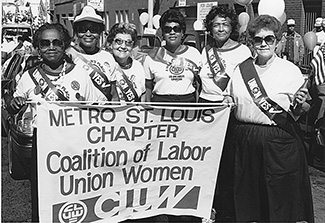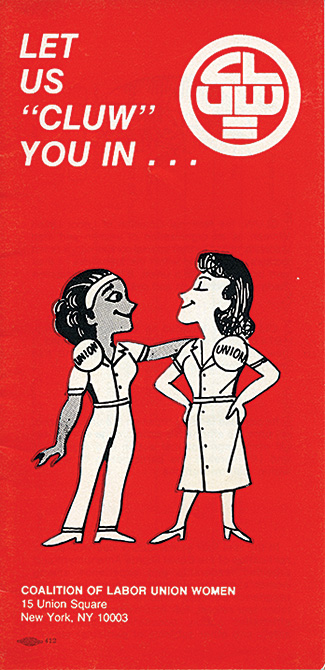St. Louis Coalition of Labor Union Women helped close the gender gap in union memberships
By ZACHARY PALITZSCH
Archivist
State Historical Society of Missouri

The national Coalition of Labor Union Women (CLUW) held its founding conference in Chicago in March 1974. Over 3,000 women, representing 58 unions, gathered to discuss how they could fight against low wages and unemployment plaguing women workers throughout the nation.
At the time of the conference, there were an estimated 34 million women in the workforce. Barely 10 percent of them were members of unions.
While it was no surprise that unionized workers enjoyed higher wages, enhanced benefits, more job security, and better work conditions than their non-unionized counterparts, the reality at the time was that the majority of women workers didn’t have the ability to negotiate more equal wages or benefits, and thus suffered economically because of it.
 One conference-goer, Nancy Hanley, a United Auto Workers member, said, “A lot of women are working for peanuts because they don’t know how to organize themselves.”
One conference-goer, Nancy Hanley, a United Auto Workers member, said, “A lot of women are working for peanuts because they don’t know how to organize themselves.”
ST. LOUIS CHAPTER BORN
Along with electing a governing board, CLUW also established the National Coordinating Committee, which was tasked with setting up local chapters. The local chapters, in turn, would focus on fighting issues within their respective areas.
The St. Louis chapter was formed several months after the inaugural conference, in October 1974. Betty Finneran, a teacher at Roosevelt High School, became the chapter’s first president. The first tasks set forth for the new chapter were to help ratify the Equal Rights Amendment in Missouri, oppose sex discrimination in housing, and gather data on women’s employment status in the area.
SUPPORTING LOCAL UNIONS
Throughout the years, the St. Louis CLUW supported and participated in local strikes such as the Quick Shop Strike of 1975, the 1979 St. Louis Teachers’ Strike, and the 1980 Bus Drivers’ Strike.
Additionally, CLUW assisted families of air traffic controllers during the 1981 nationwide PATCO strike, opposed the closing of Homer G. Phillips Hospital and helped defeat the so-called “right-to-work” law in Missouri. The St. Louis CLUW has also sponsored seminars, workshops and conferences to teach women about job safety and collective bargaining.
CLOSING THE GAP
Despite the overall decline in union membership since the 1970s, women are continuing to close the gender gap in union membership. Today, there are over 75 million women in the labor force.
With the help of CLUW’s tireless efforts in representing women workers throughout the nation, the last four decades have seen exponential growth in women union members.
According to a study by Janelle Jones, John Schmitt, and Nicole Woo (2014), in 1984, women constituted 33.6 percent of all union membership, rising to 39.7 percent in 1994, 42.6 percent in 2004, and 45.5 percent in 2014. They also predict that by 2025, women will make up the majority of union members.
IMPROVING WAGE DIFFERENTIAL
Evidence of CLUW’s efforts is also apparent in the decreasing earnings gap between men and women.
The Women’s Bureau of the U.S. Department of Labor found that in 1979, women’s hourly wages were about 64 percent of men’s. In 1988, the gap closed to about 74 percent. And In 2020, Pew Research Center showed that women’s wages increased to about 84 percent of men’s wages.
ST. LOUIS CLUW
Today, the St. Louis Metro Chapter of CLUW is one of 36 national chapters, with members representing over 70 unions from across the nation.
The chapter continues to encourage women to become actively involved in their unions and to seek leadership positions. In addition, the St. Louis CLUW encourages its members to become active participants in the political process and to seek political office. And they are, and they do!
LEARN MORE
If you would like to learn more about the organization’s history, you can find the Coalition of Labor Union Women, St. Louis Chapter Records (S0106) at the State Historical Society of Missouri, St. Louis Research Center.
The records contain meeting minutes, correspondence, bylaws, press releases, membership lists and photographs pertaining to the group’s mission to assist unionized women in obtaining their rights as workers.
Contact archivists AJ Medlock, Zack Palitzsch, or Erin Purdy at stlouis@shsmo.org for more information about the Coalition of Labor Union Women, St. Louis Chapter Records, or to schedule an appointment to freely view one of the many Labor collections available to researchers.
Founded in 1898 by the Missouri Press Association, the State Historical Society of Missouri seeks to preserve and promote study of Missouri’s history, including the history of the Labor Movement within the state. We welcome your historical records.
(Remembering our history is important to forging our future. This ongoing series is being written by the archivists at the State Historical Society of Missouri’s Research Center in St. Louis. Unions are encouraged to provide historical files for permanent retention in their archives. For details on how you can do that, contact AJ Medlock, Senior Archivist, (314) 516-5214, medlocka@shsmo.org. They are seeking original correspondence, meeting minutes, photographs, contract agreements, grievance files, and scrapbooks from Labor unions and activists documenting the Labor Movement in St. Louis and Missouri.)



Leave a Reply